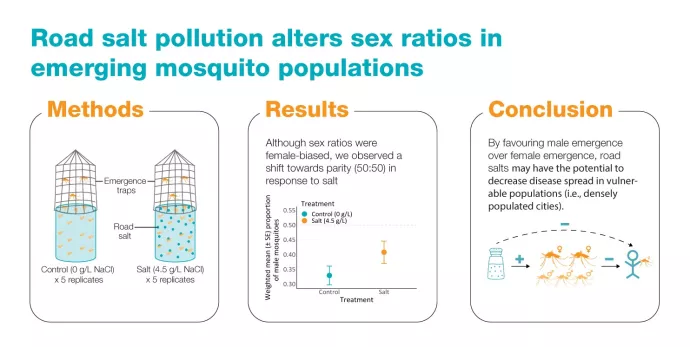
Sherry Du 1st authored paper on Road salt pollution alters sex ratios in emerging mosquito populations
Sherry Du, PhD student in Rosalind Murray’s Lab,published her first 1st authored paper: Road salt pollution alters sex ratios in emerging mosquito populations in Environmental Pollution
https://doi.org/10.1016/j.envpol.2023.122203
Sherry is a PhD student in the Murray Lab. Growing up near Lake Ontario, her concern for the environment began after participating in community litter clean-ups. Currently, she is investigating how environmental stressors (e.g., road salts) differentially affects male and female animals. In her downtime, she enjoys reading, crocheting, and illustrating.
When road salts runoff into urban freshwater environments, they can promote salt-tolerant mosquitoes. While increased mosquito abundance can heighten disease transmission risk, mosquito sexual dimorphism means that only adult females take bloodmeals and, thus, transmit diseases. Interestingly, many mosquito species display male-biased emergence sex ratios, which may be exacerbated by prolonged aquatic pollutant exposure as juveniles. Yet, the effects of road salts on emerging mosquito sex ratios remain unknown. Using emergence traps, we compared sex ratios between 0 g/L and 4.5 g/L salt added treatments in Mississauga, Ontario from June – September 2022. While mosquito abundance was significantly higher in 4.5 g/L compared to 0 g/L, we found that road salt significantly increased the proportion of emerging males from 32.8% to 40.8%. Our work illustrates the need to evaluate sex-specific abundance in pollution-related population studies. Importantly, by showing a shift toward more non-biting male mosquitoes emerging in high salinity compared to control treatments, our study suggests that road salts have the potential to decrease female mosquito success and indirectly reduce disease transmission in cities.

Congratulations, Sherry!
